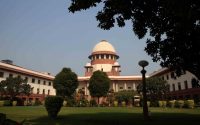$100 Website Offer
Get your personal website + domain for just $100.
Limited Time Offer!
Claim Your Website NowCroydon family suing for town to pay Catholic school, arguing state law is unconstitutional
Source:-unionleader
A Croydon family is suing the state, hoping their town will pay to send their grandson to Catholic school, a case a libertarian public-interest law firm hopes will open the door for more families to use local tax dollars to pay for religious schools.
The attorney representing the family said a recent Supreme Court decision means New Hampshire’s prohibition on local school districts paying tuition to religious private schools is discriminatory and unconstitutional.
Croydon’s way of educating children in grades 5 through 12 is an anomaly in New Hampshire. The town has a public school for children up to fourth grade. Families have the option of sending their older children to Newport schools or private schools, with the town paying the private schools up to the amount Newport public schools charged.
Gov. Chris Sununu signed a law in 2017 allowing small school districts like Croydon to pay private school tuition, if the town’s public schools do not offer all grades. But the law specifies those private schools have to be “nonsectarian,” or non-religious. The new lawsuit argues this is unconstitutional, in the wake of a June decision from the U.S. Supreme Court.
The Espinoza v. Montana Department of Revenue decision prohibited Montana from excluding religious schools from its school voucher program.
Soon after the Espinoza decision was handed down in June, attorney Timothy Keller of the libertarian-leaning Institute for Justice said he started combing New Hampshire, Maine and Vermont for plaintiffs. Keller said New Hampshire, Maine and Vermont are the only states in the country that do not allow school vouchers to be used for religious schools.
School-choice advocates in New Hampshire connected Keller with Dennis and Catherine Griffin of Croydon, he said, who are plaintiffs in the suit filed Friday in Merrimack Superior Court. The Griffins want their grandson to keep attending the Catholic school in Sunapee. The town would pay for their grandson to attend a secular private school starting in fifth grade, but not a religious school.
The complaint says the part of state law that prohibits districts paying for private religious schools, while paying for private secular schools, violates the Griffins’ First and Fourteenth Amendment rights under the U.S. Constitution.
In a statement, education commissioner Frank Edelblut said he could not comment on ongoing litigation involving the Department of Education but said he wanted the state’s education programs to be in line with two recent Supreme Court decisions related to churches and religious organizations getting public money.
“In light of the Trinity Lutheran and Espinoza decisions, I have asked the Attorney General’s Office to review our programs to ensure they comply with the law, and treat all nonpublic schools equally regardless of religious affiliation,” Edelblut said in a statement.



